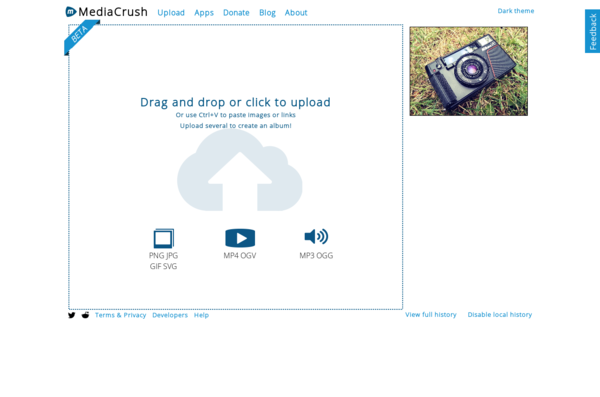MediaCrush: Open Source Image Hosting for Privacy-Conscious Users

Productivity Sauce
Next time you need to share a photo, an animated GIF, or an audio file, consider using MediaCrush. Why? Because this media hosting service is not only based on open source software, it also goes to great lengths to protect your privacy. MediaCrush uses https by default, it respects the Do Not Track settings, and it even allows you to turn off ads. The service doesn't store any history on its servers either; Instead, the history is saved locally in your browser. The only thing the service stores is your hashed IP address when you upload a file. This enables MediaCrush to identify malicious users and prevent them from uploading. MediaCrush is also transparent about its revenues, expenses, and statistics, and monthly reports are available for your perusal.
Privacy and transparency is only a part of MediaCrush's appeal. The service lets you upload and manage your media files with consummate ease. Uploading media to MediaCrush is as easy as dropping files from your machine onto the upload area of the service's web interface. When uploading multiple files, you are also given an option to create an album. For each hosted media file, MediaCrush conveniently generates links which let you embed, share, and download the file. MediaCrush stores the history locally, and you can view a list of uploaded files by pointing your browser to https://mediacru.sh/mine. There is also the MediaCrush shell script which can be used to upload files to MediaCrush from the command line. MediaCrush's source code is available on GitHub along with instructions on how to deploy the application on your own server.
comments powered by DisqusSubscribe to our Linux Newsletters
Find Linux and Open Source Jobs
Subscribe to our ADMIN Newsletters
Support Our Work
Linux Magazine content is made possible with support from readers like you. Please consider contributing when you’ve found an article to be beneficial.

News
-
Introducing matrixOS, an Immutable Gentoo-Based Linux Distro
It was only a matter of time before a developer decided one of the most challenging Linux distributions needed to be immutable.
-
Chaos Comes to KDE in KaOS
KaOS devs are making a major change to the distribution, and it all comes down to one system.
-
New Linux Botnet Discovered
The SSHStalker botnet uses IRC C2 to control systems via legacy Linux kernel exploits.
-
The Next Linux Kernel Turns 7.0
Linus Torvalds has announced that after Linux kernel 6.19, we'll finally reach the 7.0 iteration stage.
-
Linux From Scratch Drops SysVinit Support
LFS will no longer support SysVinit.
-
LibreOffice 26.2 Now Available
With new features, improvements, and bug fixes, LibreOffice 26.2 delivers a modern, polished office suite without compromise.
-
Linux Kernel Project Releases Project Continuity Document
What happens to Linux when there's no Linus? It's a question many of us have asked over the years, and it seems it's also on the minds of the Linux kernel project.
-
Mecha Systems Introduces Linux Handheld
Mecha Systems has revealed its Mecha Comet, a new handheld computer powered by – you guessed it – Linux.
-
MX Linux 25.1 Features Dual Init System ISO
The latest release of MX Linux caters to lovers of two different init systems and even offers instructions on how to transition.
-
Photoshop on Linux?
A developer has patched Wine so that it'll run specific versions of Photoshop that depend on Adobe Creative Cloud.

